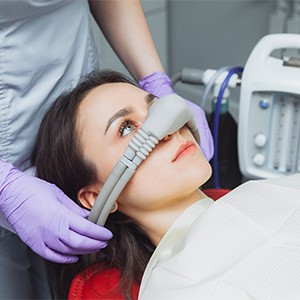Sedation Dentistry – East York • Toronto, Ontario
Leave Dental Fear In The Past

A fear of the dental office can develop in several different ways – maybe you had a negative experience as a child, or maybe the possibility of pain is just too worrisome. Whatever the case is, our team at Donlands Family Dentistry wants to help everyone undergo important treatment smoothly with the power of sedation dentistry. These safe, effective techniques can create a much more relaxing atmosphere for patients in need, helping them feel genuinely at ease for as long as they’re in our East York dental office. Your comfort is always our top priority! Contact us today to learn more, or if you’re ready to schedule a first visit.
Why Choose Donlands Family Dentistry for Sedation Dentistry?
- Children & Adults Welcome
- Highly Knowledgeable & Friendly Team of Professionals
- Comfortable, Modern Dental Office Space
Oral Conscious Sedation

Oral conscious sedation comes in the form of a medication that we’ll prescribe. Patients will receive instructions regarding when to take it, and they’ll need an escort to bring them both to and from our dental office. While you will remain awake and able to respond to questions from our team members throughout your visit, the effects of the sedation are strong enough that it’s likely you won’t remember much about the procedure upon recovery.
Nitrous Oxide Sedation

Nitrous oxide is a mild sedative that’s extremely popular among children and adults alike. If you’re wondering why you haven’t heard of it before, then there’s a good chance that you know it by another name – “laughing gas!” It’s a tried-and-true anxiety-relieving solution, so, if you struggle with dental-related anxiety, don’t hesitate to reach out to us to find out if you’re a candidate. In the meantime, you can read on to learn more about it!
Who is a Good Candidate for Nitrous Oxide?

Nitrous oxide is mild enough that it’s safe for both children and adults alike. That said, there are some patients who aren’t candidates. If, for example, you have a condition that makes it difficult to breathe through your nose, like asthma, then nitrous oxide isn’t right for you. At your consultation, Dr. Ahmed will review your medical history, assess your dental needs, and determine if you’re a good candidate. If you are, then he will add it to your treatment plan!
How Does Nitrous Oxide Work?

Nitrous oxide is administered once you’re comfortably settled into the treatment chair. At that point, one of the friendly and helpful members of our team will place a small mask over your nose. Then, they will ask you to breathe in through your nose, inhaling the nitrous oxide in the process. Within a few minutes, you’ll feel the effects kick in. Throughout your treatment, Dr. Ahmed will check in with you to make sure you’re still calm and comfortable. If at any point the flow of nitrous needs to be adjusted, then we can accommodate that easily.
Aftercare for Nitrous Oxide

There are numerous benefits that come with nitrous oxide, including that it’s mild, effective, and safe for patients of all ages. One of the biggest perks, however, is that the effects wear off within minutes. This means that patients won’t need to arrange for a trusted adult to drive them home from their appointment. Instead, they can simply return to their regular routine without any significant delays.
Note: If there are any aftercare instructions specific to the dental care you received, then we will provide you with that information before you leave so you can continue to heal and recover comfortably.
Sedation Dentistry FAQs
Is Sedation Dentistry Safe?
Sedation dentistry is a safe option for most patients who have good health. Your sedation dentist in Toronto will learn more about your health history and any medications you're taking, including those available over-the-counter, to determine if dental sedation is right for you. You will also be monitored closely by our dental team during your appointment. Typically, nitrous oxide is the safest dental sedation for patients of all ages, including children.
What Does Dental Sedation Feel Like?
Each type of dental sedation offers different effects. Nitrous oxide creates deep relaxation using an inhaled sedative, which takes effect quickly. Patients often report that their extremities feel heavy or tingly. Many also feel a warming sensation throughout their bodies. You may get a little groggy or drowsy. Once your treatment is complete and the mask is removed, you'll feel completely normal within a couple of minutes. Oral conscious sedation has stronger effects. It's not uncommon to drift off to sleep, but you won't be rendered unconscious. You can be awakened to respond to your dentist’s instructions. It can take a few hours for the medication to wear off, so you'll need transportation home from your appointment. You must take it easy for the rest of the day to allow the effects to dissipate fully. You'll be instructed not to operate heavy machinery or make any important legal decisions for 24 hours.
Will I Feel Any Pain with Dental Sedation?
Your dentist can use numbing medication along with nitrous oxide to prevent pain. You will not have outright pain, but you may experience some vibrations or pressure. Depending on your treatment, your mouth can be tender for a few days after the effects of any medications wear off. You can manage it with an over-the-counter pain reliever and eating soft foods. If there are any additional aftercare instructions, your dentist will review them before you head home.
Will I Remember Anything with Dental Sedation?
Nitrous oxide can cause fragmented memory loss for some patients. This can be a great benefit for patients who have dental-related fears or have had a negative experience in the past. Oral conscious is more likely to affect your memory of the procedure.
